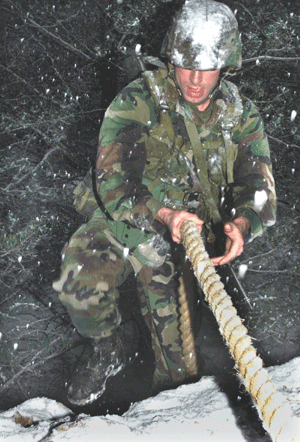The greatest weakness in the ground combat forces of the U.S. military is a lack of experience among commissioned officers serving in combat companies. A century ago, regiments usually fought as a single unit in tight formation. Colonels fought the battle while sergeants literally kept the troops "in line". Staff sergeants carried staffs to whack soldiers who fell out of step, while junior officers hung around and learned. This changed when the massed firepower of World War I forced armies to attack in a less rigid fashion, so captains led companies and lieutenants led platoons in an independent manner. This was not a big problem for the U.S. military because most lieutenants and captains had over ten years of experience.
 However,
the massive expansion of the U.S. military during World War II sped up
promotions. New officers with limited experience were assigned to lead
platoons and companies in combat. Some officers performed well, but most
were novices and many proved outright failures. This led to many troops to
question the wisdom of assigning green officers to lead units when experienced
sergeants were available. This
problem was recognized, so after the war the U.S. military developed a system of
training large numbers of reserve officers. This was an excellent
solution, until Congress established an "up or out" career system in
which officers were rapidly promoted according to a rigid timetable or forced
out. As a result, combat
performance in Korea and Vietnam suffered as new officers began at the company
level, but then moved to staff positions a couple years later upon promotion.
However,
the massive expansion of the U.S. military during World War II sped up
promotions. New officers with limited experience were assigned to lead
platoons and companies in combat. Some officers performed well, but most
were novices and many proved outright failures. This led to many troops to
question the wisdom of assigning green officers to lead units when experienced
sergeants were available. This
problem was recognized, so after the war the U.S. military developed a system of
training large numbers of reserve officers. This was an excellent
solution, until Congress established an "up or out" career system in
which officers were rapidly promoted according to a rigid timetable or forced
out. As a result, combat
performance in Korea and Vietnam suffered as new officers began at the company
level, but then moved to staff positions a couple years later upon promotion.
This flawed system is still used today. Any officer (without enlisted experience) who thinks they were a competent platoon leader as a new lieutenant has a faulty memory or an ego problem. Officers are better leaders as they gain experience and maturity. The Marine Corps recognized this in recent years when it formed Fleet Anti-terrorist Security Team (FAST) companies. Since these companies operate independently, majors command them, with captains as platoon commanders. This is not a new idea; company commanders in the British Army are majors, a practice strongly endorsed by one of America’s most experience warriors, Col. David Hackworth, (ret) in his famous book About Face.
The idea of assigning a major to command companies should be expanded to all combat units. A major serving as company commander will have graduated from an advanced school, gained broader leadership experience, and read more professional books and journals. As a result, he will command greater respect from his enlisted men, and is better prepared to deal with rear echelon officers. Likewise, a captain is better suited to serve as company executive officer. As a result, the 1stLts now filling the executive officer positions could remain as platoon leaders, thus increasing experience at that level.
Nevertheless, leadership experience at the platoon level remains a problem. Officers must gain experience somewhere, but does a rifle company deserve five lieutenants learning the ropes? Since too many junior officers with combat specialties are produced to fill a limited number of career positions at the field grade level, E-7 sergeants should lead support platoons. For example, a staff NCO with over 20 years experience is better suited to lead a weapons platoon than an "experienced" 1stLt. This would speed up the slow enlisted combat promotion pipeline and open career options. The opportunity for selection to first sergeant is extremely limited, so outstanding infantry sergeants are promoted to E-7s and become "too experienced" to serve in rifle companies, while others are “passed over” and forced out. Allowing senior sergeants to become weapons platoon leaders will boost morale and retention, as well as combat effectiveness.
A rifle company should not be led by a captain and five lieutenants, but a major, a captain, three lieutenants, and a senior sergeant, more than doubling the years of leadership experience. This will not only boost the combat power of companies, but also provide young lieutenants with experienced teachers. Relying on novice officers to fill the frontline positions was never planned, but it remains a major weakness that can be corrected.
Carlton Meyer editorG2mil@Gmail.com